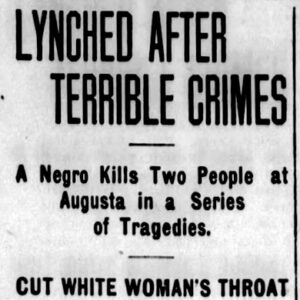calsfoundation@cals.org
Dean, Arthur (Lynching of)
On September 9, 1911, a twenty-three-year-old African-American man named Arthur Dean was lynched in Augusta (Woodruff County) for a crime spree that ended in the alleged murder of a white woman named Mrs. Albert Vaughan.
According to the Arkansas Gazette, Dean had earlier been convicted of assault and had been released from the penitentiary two weeks before the crime spree. On the morning of September 8, he went to the home of Tom Ligon, an African-American farmer who lived five miles east of Augusta. This was perhaps Thomas Ligon, listed on the 1920 census as a tenant farmer living in Augusta with his wife, Mary, and six children aged thirteen and under. While at Ligon’s home, Arthur Dean encountered an “aged negress” named Harriet Dean, who may have been his mother. Although Woodruff County records reveal nothing about Harriet Dean, in 1900 a forty-nine-year-old widow of the same name was living in Beat 3, Marshall County, Mississippi. Also in the home were children Cora (age fourteen), Arthur (age thirteen), John (age nine), Phinas (age five), and Hannah (age three). Her son would have been similar in age to the alleged murderer.
Harriet Dean was at Ligon’s home with several children, and Arthur took Ligon’s shotgun, drove the children away, and attacked her. He then ransacked the house for shells, and left with the gun and ammunition. When the incident was reported, he was supposedly apprehended by authorities but managed to escape. At 9:00 p.m., he allegedly shot and killed an African-American man named Dennis Clark, who was sitting by his window. The two had apparently had an earlier disagreement. According to census records, in 1910 the twenty-four-year-old Clark, a farmer, was living in Augusta with his wife, Emma.
Soon after killing Clark, Dean appeared at the home of another black family in New Augusta but did not manage to enter the house. He then saw a light in the nearby home of white farmer J. T. Bostleman, where Bostleman’s daughter, Mrs. Albert Vaughan, was sleeping with her two small children. Her young brother and a hired man were also in the house. Both Bostleman and Mr. Vaughan were out of town. While the census lists Bostlemans in Woodruff County, there was no one with initials or a first name that matches. There was an Albert Vaughan in the county in 1910. He was farming and living with his wife, Ida, and two small children in Augusta.
Dean allegedly entered the house and went into the room where Vaughan was sleeping. When she heard him, she assumed it was her husband returning and was not alarmed. According to the Monticellonian, she did not realize her mistake until Dean’s “big black hands were felt around her neck.” She screamed, but before her brother or the hired hand could get to her, Dean allegedly drew a razor and slashed her throat. He then escaped through the front gate. Vaughan lived long enough to give an account of the crime and to describe her assailant.
Dean was captured at Bald Knob (White County) early on the morning of September 9. He was taken to Augusta, where he allegedly confessed. According to the Arkansas Gazette, after he appeared before a justice of the peace, officers attempted to take him from the office but encountered a mob of “a hundred sullen and determined men.” The officers tried to protect him, but they were overpowered. The mob put a rope around Dean’s neck and dragged him to a mill shed belonging to the Sowle Lumber Company, where they hanged him. Dean’s body was cut down and buried the following day. The Arkansas Gazette reported that local residents felt that the lynching was justified. As “the affair was carried out in as quiet and orderly a manner as would have been possible at a legal execution,” and Dean was not tortured but put to death “as speedily and quietly as possible [i]t is not considered probable that there will be any arrests in connection with the affair.”
For additional information:
“Augusta Regains Its Normal Quiet.” Arkansas Gazette, September 11, 1911, p. 7.
“Lynched after Terrible Crimes.” Monticellonian, September 14, 1911, p. 1.
“Negro Lynched after Series of Tragedies.” Arkansas Gazette, September 10, 1911, p. 1.
Nancy Snell Griffith
Davidson, North Carolina
 Civil Rights and Social Change
Civil Rights and Social Change Early Twentieth Century, 1901 through 1940
Early Twentieth Century, 1901 through 1940 Arthur Dean Lynching Article
Arthur Dean Lynching Article 




Comments
No comments on this entry yet.